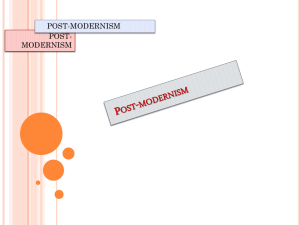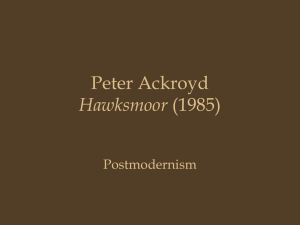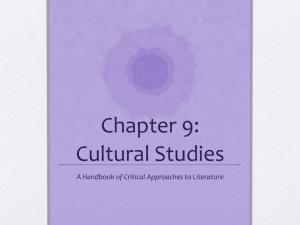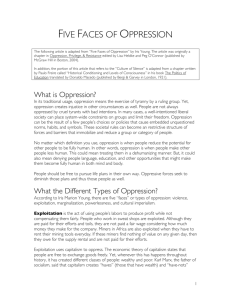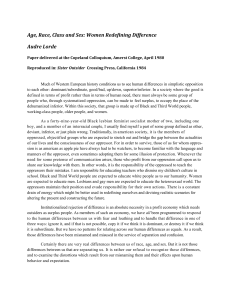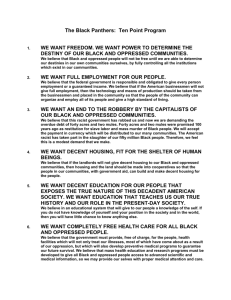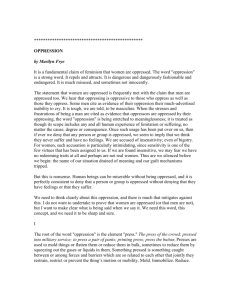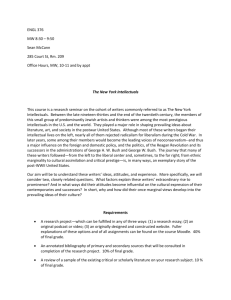Postmodernism vs science
advertisement
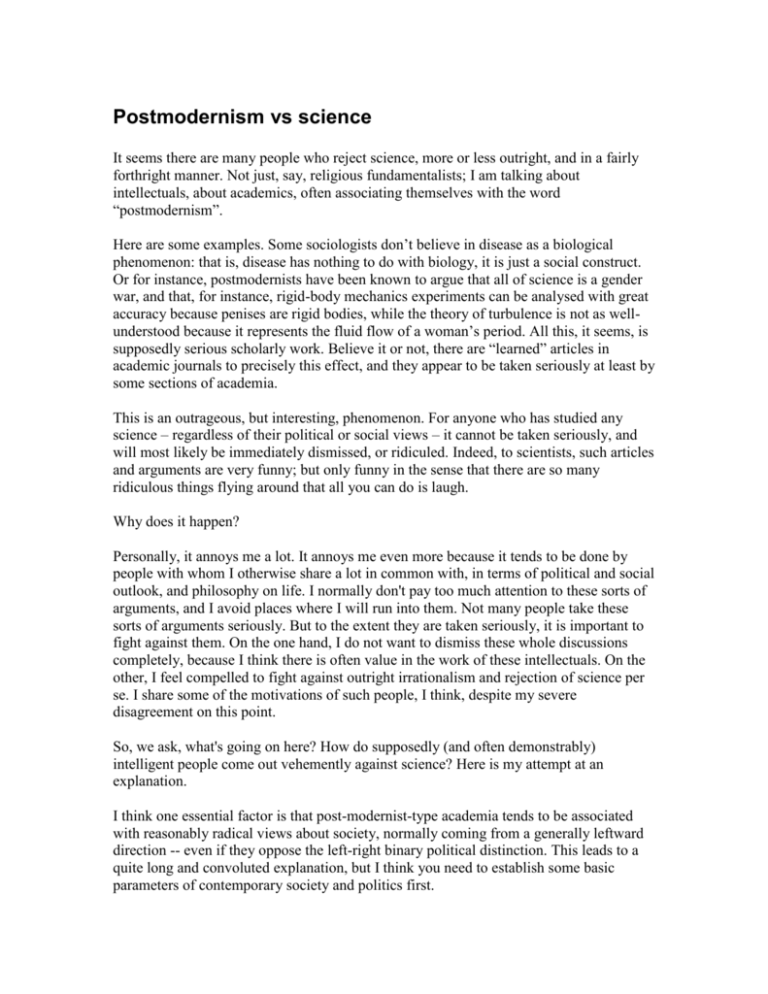
Postmodernism vs science It seems there are many people who reject science, more or less outright, and in a fairly forthright manner. Not just, say, religious fundamentalists; I am talking about intellectuals, about academics, often associating themselves with the word “postmodernism”. Here are some examples. Some sociologists don’t believe in disease as a biological phenomenon: that is, disease has nothing to do with biology, it is just a social construct. Or for instance, postmodernists have been known to argue that all of science is a gender war, and that, for instance, rigid-body mechanics experiments can be analysed with great accuracy because penises are rigid bodies, while the theory of turbulence is not as wellunderstood because it represents the fluid flow of a woman’s period. All this, it seems, is supposedly serious scholarly work. Believe it or not, there are “learned” articles in academic journals to precisely this effect, and they appear to be taken seriously at least by some sections of academia. This is an outrageous, but interesting, phenomenon. For anyone who has studied any science – regardless of their political or social views – it cannot be taken seriously, and will most likely be immediately dismissed, or ridiculed. Indeed, to scientists, such articles and arguments are very funny; but only funny in the sense that there are so many ridiculous things flying around that all you can do is laugh. Why does it happen? Personally, it annoys me a lot. It annoys me even more because it tends to be done by people with whom I otherwise share a lot in common with, in terms of political and social outlook, and philosophy on life. I normally don't pay too much attention to these sorts of arguments, and I avoid places where I will run into them. Not many people take these sorts of arguments seriously. But to the extent they are taken seriously, it is important to fight against them. On the one hand, I do not want to dismiss these whole discussions completely, because I think there is often value in the work of these intellectuals. On the other, I feel compelled to fight against outright irrationalism and rejection of science per se. I share some of the motivations of such people, I think, despite my severe disagreement on this point. So, we ask, what's going on here? How do supposedly (and often demonstrably) intelligent people come out vehemently against science? Here is my attempt at an explanation. I think one essential factor is that post-modernist-type academia tends to be associated with reasonably radical views about society, normally coming from a generally leftward direction -- even if they oppose the left-right binary political distinction. This leads to a quite long and convoluted explanation, but I think you need to establish some basic parameters of contemporary society and politics first. First: there is oppression in today's society, there is tremendous injustice. Suppose you are a woman, or a member of an ethnic minority, or a coloured person, or a poor person, or you live in the third world. I'm going to stick to the first world; but even there such groups have been oppressed in society for a long time, and still are to a great extent. You grow up, you go through school, and you are oppressed. What does oppressed mean? Oppressed here does not mean you get shot when you criticize the government or anything like that. Oppressed does not mean that you are formally prohibited from doing things, it does not mean that none of your type get anywhere. There are lots of females and ethnic minorities in high-ranking positions in business and in government and academia, perhaps; there are equal opportunity laws; there are laws against discrimination; there are social security laws which help the poor somewhat; there is even a progressive income tax, maybe. But still the system doesn't work. There is oppression in the sense that certain groups within society are not able to fulfil their potentials, to a substantial degree, as much as other groups. They are more likely to be unemployed, they earn less, they have no networks with, and are disconnected from, power. This is not to mention outright attack from racists, or from capitalists wanting to regress the tax system, or from conservatives wanting to dismantle affirmative action or social security systems. Second: there is not only injustice, there are large portions of society dedicated to legitimising and justifying injustice; consequently there is hopelessness. Thus there are huge economics departments dedicated to praising capitalism despite the savage inequalities, inefficiencies, and burnout it causes; there are newspapers staffed by establishment opinion-makers and declaring the world-view of power as fact; intellectuals who side with the establishment are raised up and broadcast to the people from on high; dissent is marginalised; and there are vast industries of entertainment, television, advertising, dedicated to distracting us from reality. Even if you are strong enough mentally or find your own network, you are hemmed in on all sides. One response is to give in, to submit, to accept the system, for all its evils, and become a part of it, whether actively singing its praises or preferring not to think about it, and yourself perpetuate injustice. The other response is to resist, passively, but see no way out, no escape, without allies, without hope, without vision. There are few alternatives, for many people, in this realm. Third: for resisters, for rebels, the greatest anger is directed at the powerful; for intellectuals, the greatest anger is directed at the powerful intellectuals, that is, the legitimisers. Some might be angry at Bill Gates, say; but those who want to criticise him with words will not come up against him, but all the economists, all the shock-jocks, all the op-ed writers, the establishment intellectuals, the voices of the state, all these forces. They are a formidable combination. They will likely suffocate you. The reaction becomes visceral and extreme. You find yourself disagreeing instinctively with anything on the nightly news. You find yourself not able to understand what in the hell power is doing; is it just that they are evil? Well, perhaps not, but the point is the degree of animosity that develops from this sort of intellectual oppression, this lack of "space" (as a postmodernist would put it) for dissenting views. Fourth: much of this legitimizing process is supposedly based on rationality and science; much of the dissent is based on emotion and instinct. It is an attribute of power that there are time and resources spent to thinking calmly about the issues and presenting methodically the point of view. Thus we have economists carefully explaining to commerce students the supposed benefits of capitalism; we have no shortage of conservative businessmen asserting their point of view, in the newspapers or on the TV, or in everyday economic life; the arguments for the status quo do not have to be made with urgency, they can calmly pick apart the criticisms and explain why proposed alternatives will only make us worse off. Economics is clothed in mathematical formulas and supposed "proof" of how it makes us "better off". The IMFs and the WTOs of this world come to societies and impose upon them their models of economics, with supposedly detailed, careful, rational analysis about how we will benefit; and we rarely, if ever, do. Tremendous distrust is generated against scientific thinking, against this supposed "rational thought". Can't you see people are dying? How can you possibly want to kill them faster by outlawing generic drugs? The WTO politely waits for you to finish, says it shares your concerns, it is trying to alleviate poverty, and economic development will bring economic benefits for all. Can't you see people are starving, people are in poverty? How can you want to deregulate the economy? The IMF has an army of consultants to prove that their proposed (i.e. enforced) course of action will in fact ease poverty. Can't you see how many are unemployed? How can you possibly want to make it harder for them? The government calmly explains it provides an incentive to get back to work. In some sense the criticisms can be made dispassionately; and to some extent maintenance of the status quo can excite passion. But the axioms of rational thought can be placed essentially arbitrary: and the axiom of a market economy is much more firmly established, say, than the axiom of the human rights of the poor. If the edifice of capitalism were about to go down, I dare say the economists would be at least as loud in their hysteria. And for those who are resisting power in the name of the human rights of the poor, say, those axioms are held very very tightly, they excite very basic human instincts of justice and compassion. However it is the positions of the two sides within society, and its institutions, that determines the nature of the arguments, and how they are argued. Similar examples abound, I am sure. Fifth: more generally, much of the problems of the present-day world can be traced to industrial development and "progress", based on science and the scientific process of engineering. All the pollution, all the global warming, all the mechanization, is due in the end to science. The modern repetitive mind-numbing soul-destroying job, in the factory or the office, is just part of the process. Enormous energy, of scientists, of academics, of engineers, various technicians of science, are devoted to the production of weapons, of tools for killing people. Science gave us the nuclear weapon. Almost anything in modern society, in the end, can be traced back to science. Science changes our world and it has very often changed it for the worse. So that is the situation. And say you are not a particularly scientific person. You haven't studied science, you don't have much experience of it, apart from its role in making your life, and the plight of the human race, miserable. So perhaps, out of this, there is some natural antipathy among some people towards science. Perhaps, maybe, you think that science is this monolith which, like capitalism, like globalization, like men, like white people, has created much of what is wrong with the world today. Science has and is mostly done by white men in rich countries. It is done by oppressors; it is used by oppressors; it is often used quite explicitly as a tool of oppression. There is plenty of gender and racial discrimination in science, simply as empirical fact. But now, there is something new! Finally, in the midst of this situation, there is the university, and there is postmodernism. The university is an oasis for resisters, for rebels, for radicals, for those who see things differently to power. Within the university there are different departments: some (like physics and mathematics) are dedicated to science itself, some (like economics and marketing) are crucial parts of the legitimizing process, and some (like history, business school, and some parts of sociology) are dedicated to trying to explain how the world of humans works. Then there is this thing called postmodernism. In a sense it is a dogma: there is no right; there is no wrong; there is nothing true; there is nothing false; there are no opposites; everything is fuzzy. It's like Zen, or like Marxism; it's so vague and sprawled out that if you try to sum it up you can be shot down immediately. In another sense postmodernism is the opposite of dogma: inspired by seeking out new forms of thought, new ways to analyse, new ways to conceptualise. One of the pre-existing modes of thought is scientific; and this is to be criticized, to be transcended. How, or how possibly, I personally have no idea. But if you attack it from the viewpoint of science you can immediately be deflected and ignored: you are a rationalist, and that is an outmoded form of thought. Appropriately enough, attention is often focused on progressive social issues, like gender, like the degradations of modern capitalist life, like race relations, like power relations -- in general, various modes of oppression. And much of the oppression that does occur in the world is fuzzy, it's hard to get a handle on, as I mentioned before. Much racial and gender discrimination can only be appreciated through patterns, through subconscious actions like saying "he" for a non-specific person, picturing a random nonspecific person as white or male or in your country, and so on. Attacking capitalism is hard to do through the edifice of mainstream economics; much easier to go for something vague about consumer culture or studying the entertainment industry. So, and to some extent quite rightly so, some of the thinking becomes a little fuzzy. Perhaps this goes some way towards explaining this "rigid bodies are penises" phenomenon. And, what's more, the edifice of postmodernism serves an important social purpose: it provides employment for these sorts of people! You can critique a critique of a critique of something about the gender relations of some literary piece from the nineteenth century, or something like that. The possibilities are endless, and they can never end; drawing conclusions are basically anathema to the whole philosophy. It can only deconstruct itself, over and over and over again. It justifies its own existence in this way. Given this sort of feedback loop, perhaps it's not too surprising that there is a tendency to go overboard. The whole subject is basically ignored by the rest of the world, and insulated from outside criticism as a result; and outside criticism can always be dismissed as misinformed, or outmoded. So perhaps those who study "social constructs" --- and there are many things in life which are social constructs (like how I think of myself, like how I act around women, like a large part of sexual morals, like social norms in general), and which actually thinking about in this way helps you to understand the world --- might get carried away occasionally, and instead of analyzing a disease like anorexia as part of a social construct (which it is, through the culture of vanity and cosmetics and advertising and so on), jump to the conclusion that all disease is a social construct. I'm not sure how useful this is. But this is how I understand the basic situation, at least in outline.

